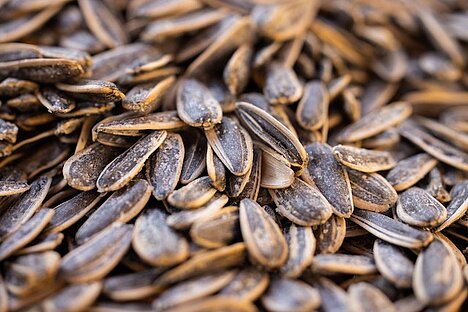Sunflower seeds

What are the benefits of sunflower seeds for dogs?
Sunflower seeds contain many valuable nutrients that are important for your dog's health. These include:
- Protein: Sunflower seeds are a good plant-based source of protein, which promotes muscle building and cell regeneration.
- Fat: Sunflower seeds are rich in unsaturated fatty acids, which support your dog's cardiovascular system and coat. They also provide plenty of energy.
- Vitamins: Sunflower seeds mainly contain vitamin E, a powerful antioxidant that strengthens the immune system and inhibits inflammation. They are also a source of vitamins B1, B5 and B6, which are involved in various metabolic processes.
- Minerals: Sunflower seeds are rich in magnesium, which is important for bones and nerve function. They also contain potassium, iron, zinc and selenium, which also play a role in your dog's health.
What are the disadvantages of sunflower seeds for dogs?
Although sunflower seeds are healthy, they are also very high in calories. A handful (approx. 30 g) has around 170 kcal. This corresponds to about 10% of the daily energy requirement of a medium-sized dog. If you give your dog too many sunflower seeds, he can quickly become overweight. Obesity can lead to various diseases such as diabetes, osteoarthritis or heart problems.
Sunflower seeds can also trigger allergies or intolerances. Some dogs are sensitive to vegetable proteins or fats and show symptoms such as diarrhea, vomiting or itching. If you notice that your dog shows such signs after eating sunflower seeds, you should stop giving them to him and consult a vet.
How can you offer your dog sunflower seeds?
If you want to give your dog sunflower seeds, you should keep a few things in mind:
- Choose unsalted and unroasted sunflower seeds: salt can increase your dog's blood pressure and lead to dehydration. Roasting can destroy the nutrients in the sunflower seeds or release unwanted substances.
- Remove the shells: Sunflower seed hulls can have sharp edges and injure your dog's mouth or digestive tract. They can also lead to an intestinal blockage if ingested in large quantities.
- Crush the sunflower seeds: If you leave the sunflower seeds whole, your dog will not be able to chew and digest them well. It is therefore better to crush or grind them. You can grind them in a blender or coffee grinder, for example.
- Only give your dog small amounts: As mentioned, sunflower seeds are very high in calories and should only be given as an occasional treat or supplement. A small pinch (approx. 5 g) per day is sufficient for a medium-sized dog.
- Mix the sunflower seeds with the food: You can mix the sunflower seeds with your dog's normal food or sprinkle them over the food as a topping. This way you can increase acceptance and improve nutrient intake.
Sunflower seeds are not poisonous to dogs and can even be beneficial to their health if given in moderation. They contain many important nutrients that support your dog's well-being. However, you should make sure that you only give your dog unsalted, unroasted and shelled sunflower seeds in small quantities to avoid obesity, allergies or digestive problems.
Properties 6
Are you looking for other ingredients with a specific property?
Just click on them to find more.
If you notice any signs of hypersensitivity or poisoning in your dog, you should see your vet immediately. We are not a substitute for a vet, but we try to be as accurate as possible. Every dog reacts differently and we recommend you get a second opinion or consult your vet if in doubt.
Stay healthy and take good care of your four-legged friend!😊